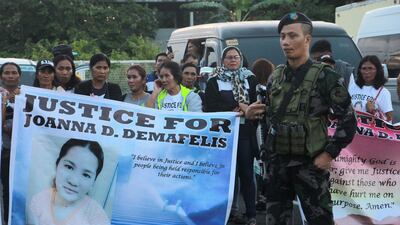Lucy Giberson, 69, has met with cardinals from the Vatican, travelled to almost 50 countries, cemented herself as a leader in her community and raised a dozen children – half of whom were not hers.
More than 250,000 Filipinos work in Kuwait and Ms Giberson has been one of them since 1984.
On Monday Philippines President Rodrigo Duterte extended a ban on its citizens working in the country over reports of Filipino workers suffering abuse and exploitation in the Gulf state.
The move followed the discovery of the body of Joanna Daniela Demafelis, a Filipina maid, in a freezer.
But while the "total ban" announced by Labour secretary Silvestre Bello on Monday is only pertinent to new employment in Kuwait, Ms Giberson was surprised to hear the news.
“We are shocked, I am here for 33 years and I have enjoyed my life because I live here like they are my family,” she said, referring the Kuwaiti family she works for.
Filipino ambassador to Kuwait, Renato Pedro Villa, told local press that an investigation by the public prosecution office in Kuwait was launched after a tip by Interpol identified Ms Demafelis' employers, a Lebanese-Syrian couple.
“I am not against the president ... he has compassion but he needs to understand the problem first before criticising,” she explained.
During her three decades in Kuwait Ms Giberson volunteered at the Filipino embassy to help transitioning newcomers to the country. She does not deny that there are some cases of abuse in the country.
The day after Mr Duterte's comment, an online petition was launched in Kuwait to give a voice to the thousands of people who reject the ban.
“I can testify that there is a really good heart here, not all you can see. I always defend, I know there are some people suffering, I know that, but I also know that from 250,000 Filipinos working here they receive protection,” she said.
_______________
Read more: Philippines imposes 'total ban' on citizens taking up jobs in Kuwait
_______________
A 24-hour helpline is available at the Philippine embassy with the Kuwait government providing illegal workers with amnesty, protection and flights home. The amnesty allows workers to depart without penalty until February 22.
Ms Giberson's employer has encouraged her to reach out to her embassy and speak out about her positive treatment over the past three decades.
The family for who she works donated money to help their employee build a house in Manilla, where Ms Giberson's family now lives.
“My daughter told me: 'mama I will put a big banner on our house to say that this house is donated from a Kuwaiti family.’ Because we are proud, I live there like they are my family,” recounted Ms Giberson.
“At first, when I heard the news I got really worried. My friends in Philippines are going to Kuwait because we need our jobs, because we have to support our family,” said Nersas Villanueva, who has been working in Kuwait since 2013 as a caretaker to two children of a young Kuwaiti couple.
“I need this job to support my niece’s education, and I enjoy my job,” she said. ”My employers treat us like family, not like staff because they see the service we are providing.”
Ms Villanueva's Whatsapp photo is of her and the daughter she is raising in Kuwait.
However, some believe the recent attention could serve to put pressure on unscrupulous employers.
“Duterte cares about his country. I know not all Filipinas in Kuwait are in trouble, but there are some. We need to give them the freedom to go home if they want,” said LK, a manager in a supermarket in Kuwait City who asked that her real name not be revealed.
Other house workers said their embassy recommended they express dissatisfaction with their abusive employers if they wanted to go home.
About 1,700 workers have come home since the news broke, but not all left because of abusive workers.
Filipino workers often leave their home country in search of higher salaries. Back home even skilled workers like computer engineers earn only about 49,300 pesos (Dh3,526) a month, according to government figures.
Some 10 million Filipinos work overseas in a variety of jobs. Their cash remittances, which the central bank says was over $28 billion last year, are a major contributor to the Philippine economy.

